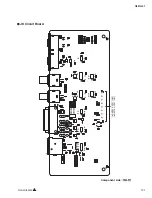
SIM340 Hardware Design
Note
:
For detail information about serial port application, please refer to document [10]
3.9 Audio interfaces
Table
11
: Pin definition of the Audio interface
Name
Pin
Function
MIC1P
53
Microphone1 input +
MIC1N
55
Microphone1 input -
SPK1P
54
Audio1
(AIN1/AOUT1)
SPK1N
56
Audio1 output-
MIC2P
57
Microphone2 input +
MIC2N
59
Microphone2 input -
SPK2P
58
Audio2
(AIN2/AOUT2)
SPK2N
60
Audio2 output-
The module provides two analogy input channels, AIN1 and AIN2, which may be used for both
microphone and line inputs. The electret microphone is recommended when the interface used for
microphone. One of the two channels is typically used with a microphone built into a handset. The
other channel is typically used with an external microphone or external line input. The module
analogy input configuration is determined by control register settings and established using
analogy multiplexes.
For each channels, you can use AT+CMIC to adjust the input gain level of microphone, use
AT+SIDET to set the side-tone level. In addition, you can also use AT+CLVL to adjust the output
gain level of both receiver and speaker at the same time, use AT+CHFA to activate one of the two
audio channels and deactivate the other one.. For more details, please refer to
document [1]
.
Note: Use AT command AT+CHFA to select_audio channel:
AIN1/AOUT1 (normal audio channel), the default value is 0.
AIN2/AOUT2(aux_audio channel) .
It is suggested that you adopt one of the following two matching circuits in order to improve audio
performance. The difference audio signals have to be layout according to difference signal layout
rules. As show in following figures
(Note: all components package are 0603.)
If you want to
adopt an amplifier circuit for audio, we recommend National company’s LM4890. Of course you
can select it according to your requirement.
SIM340_HD_V3.09
18.03.2009
39
















































